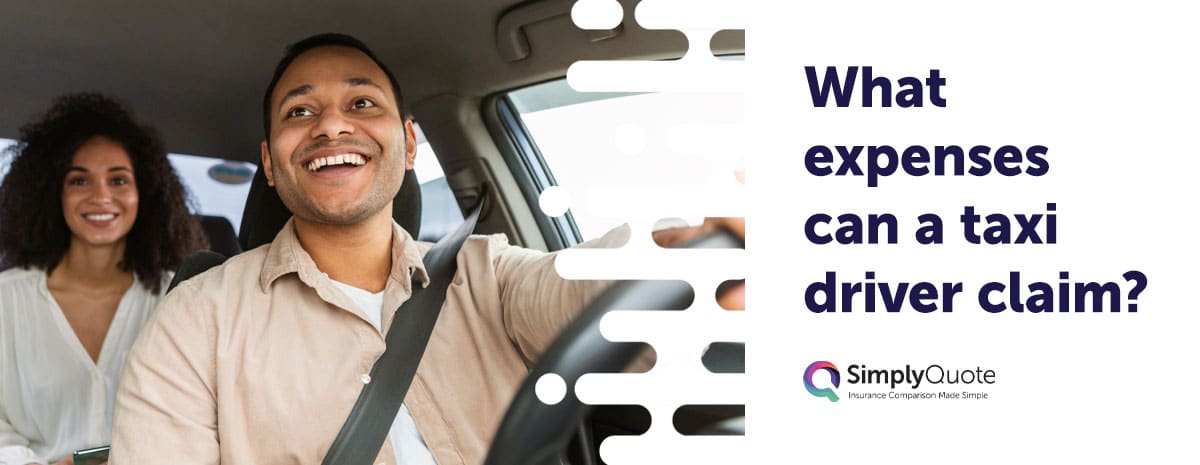What expenses can a taxi driver claim?
The expenses taxi drivers can claim include fuel, vehicle repairs, licence fees, taxi insurance, mileage, and toll fees.
Various jobs and industries have allowable expenses that can be claimed. As a taxi driver, it’s important to know exactly what expenses this entails.
As a public hire taxi driver, are you claiming for the 11 things listed below? And what additional claims can be made by other drivers?
Let’s explore the nuances of taxi driver tax.

What expenses can taxi drivers claim as tax relief?
Taxi drivers can lower their tax bill by expensing the following:
1. Fuel costs
As a taxi driver, you can claim 100% of the VAT on your fuel costs (e.g. petrol, diesel, EV charging expenses). However, these claims can only be for business expenses. The driver must prove that the fuel was used for work purposes, not personal trips.
2. Vehicle repairs and maintenance
Any costs associated with running your vehicle can be claimed, including:
- Car servicing and maintenance
- Repairs
- Annual road tax (also known as Vehicle Excise Duty)
- MOT test
3. Licence and registration fees
Any fees associated with your vehicle and company can be claimed, including taxi operator licensing and registration fees.
4. Taxi upkeep
Washing and cleaning your vehicle is also eligible for tax relief. These expenses are sometimes included in the mileage fee, but it differs when you are a self-employed taxi driver.
5. Interest on loans
If the vehicle used to run your taxi business was financed with a loan, you can claim back the interest on it.
6. Toll and parking fees
These fees are only tax deductible if they occur while conducting business – not for personal driving.
7. Radio hire
Some cab drivers opt to install a two-way radio for communications. These can be hired from various companies and the expense can be claimed.
8. Taxi insurance
Taxi insurance, a type of public liability insurance, is considered a business and permissible expense (per the HMRC) and is tax-deductible.
Bonus read: [Do taxi drivers need public liability insurance].
8. Breakdown cover
If you do not have public hire insurance, your public liability insurance likely doesn’t include breakdown cover. This can be added to your taxi insurance policy and be claimed as part of your business expenses. Depending on your policy and the company you are insured with, specialist-hired vehicles may be available if your car is out of commission.
9. Accounting fees
Taxi drivers can claim some of their accountant’s fees. Self-employed taxi drivers can claim accounting expenses directly related to their business operations.
This includes tax advice on business issues. If your accountant deals with your personal and business matters, only services relating to your work are tax-deductible.
10. Mileage
Taxi drivers can claim mileage incurred while working to reduce their tax bill. There are two stipulations for submitting this kind of claim:
- The driver must be on shift
- The driver must be working in their licensed area.
Taxi drivers need to keep a log of the miles they have covered while on shift.
Bonus read: [Can taxi drivers work outside their licensed area].
11. Membership fees
Any memberships required for taxi drivers to conduct their business are eligible for tax reductions. These memberships include:
- Royal Automobile Club (RAC)
- Automobile Association (AA)
- Taxi associations
Looking for cheap taxi insurance? Get your quote today!
Get QuotesDo claims differ between public and private hire taxi drivers?
Private hire taxi drivers can claim the same expenses as public hire drivers.
However, private hire insurance is required for this type of business, which can still be claimed as an expense. Given the difference in the nature of their jobs, there are a few other things that private hire drivers can claim for:
Advertising and marketing fees
Private hire drivers can claim for any marketing or advertising done for the business. This includes advertising on social media, vehicle signage, and local newspaper ads.
Simplified expenses
Simplified expenses are exclusive to private hire taxis and cannot be used by black cab companies. This refers to claiming for a set monetary amount per mile travelled while working within the relevant tax year.
This equates to 45p/mile for the first 10,000 miles in a tax year, followed by 25p/mile for subsequent years – also known as HMRC’s Fixed Scale Mileage Rate. This option serves as a means to cover:
- Fuel
- Insurance
- Servicing
- Repairs
Drivers who opt to claim simplified expenses may not claim for the abovementioned expenses individually. Additionally:
- Claims cannot be made on a car that has already claimed capital allowances.
- Simplified expenses do not have to be applied to all your vehicles.
- The vehicles used to claim simplified expenses must remain as such for as long as that vehicle is used for business purposes.
Office expenses
If you operate your taxi business from an office, this can be claimed as an expense (rent, utilities, booking systems, internet, etc.)
Phone usage
Phone usage for business purposes is also tax-deductible. This includes phone contracts, data and minutes.
Do claims differ for self-employed taxi drivers?
A self-employed taxi driver can claim for the same things as a private or public hire taxi driver. The only difference is when it comes to submitting your self-assessment tax return:
As a self-employed driver, you will need to:
- Register as self-employed with HMRC.
- Fill out a self-assessment tax return (this can be done online).
- Apply and pay for National Insurance – a special kind of tax that goes towards state pension when annual profits exceed £6,475.
- Claim tax relief on the expenses listed.
- Adhere to tax submission deadlines.
The UK tax year runs from 6 April to 5 April the following year. This means you must submit your self-assessment tax return online and pay your taxes between 6 April and 31 January of the following year. The paper return must be submitted by 31 October of the same tax year. Failure to submit in time will result in an instant £100 late submission penalty.
Final thoughts
UK taxi drivers can claim many expenses, from fuel costs and personal loans to vehicle insurance and membership fees.
Whether you’re a public or private hire taxi driver, be sure to know exactly what you are liable to claim for. Perhaps you’ve overlooked something mentioned on this list. If you are new to taxi driving, it’s wise to compare insurance quotes with SimplyQuote‘s online comparison tool to save even more on your expenses.
Frequently Asked Questions
Capital allowance is much like a tax-deductible expense. In the case of taxi drivers, this would refer to the money spent on a vehicle for the purpose of long-term business growth.
No, taxi drivers cannot claim traffic fines or parking tickets as a business expense.
You can keep track of your expenses and mileage in a logbook. If you are extremely busy, accounting software and other online tools will make your life easier, especially when filling out a tax return.
You must subtract any business expenses from your total income to calculate your taxable profit. Your total income is made up of:
- Tips
- Ride fares
- Bonuses
You’ll pay income tax on the remaining profit after this calculation.
